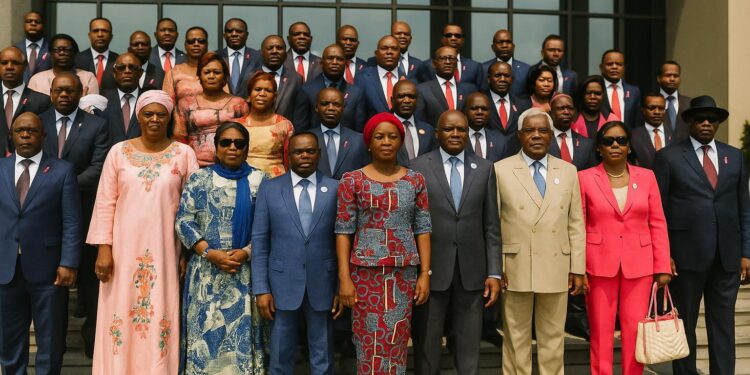Lawmakers spotlight women’s cancers
Inside the circular plenary hall, lawmakers, aides and security staff paused budget debates to listen to oncologists from the Brazzaville University Hospital. The session, held on 29 October, marked the first parliamentary awareness day fully dedicated to breast and cervical cancers.
Partnering with the World Health Organization and the Ministry of Health, the National Assembly aimed to translate clinical facts into legislation and constituency action. The chair declared that safeguarding women’s health underpins productivity, family stability and the attainment of the national development plan.
Professors Judith Nsondé-Malanda and Clotaire Itoua detailed tumour biology, warning that in Sub-Saharan Africa over 70 % of cases reach hospitals at advanced stages (WHO, 2023). Surgeon Donatien Moukassa walked deputies through self-examination, low-cost visual inspection and referral protocols suited to primary care centres.
Late diagnosis and economic impact
WHO Resident Representative Dr Vincent Dossou Sodjinou reminded legislators that late diagnosis strips an economy of experienced workers, pushes households into poverty and inflates the social security bill. Breast and cervical cancers already cost African countries an estimated USD 3.8 billion annually in lost productivity (IARC, 2022).
He noted that the Republic of Congo validated the introduction of HPV vaccination for girls aged ten to fourteen, aligning with the Global Breast Cancer Initiative 2021-2030. Early immunisation, he argued, could avert up to 90 % of future cervical cancer cases.
Deputy Speaker Roland Bouiti Viaudo bridged medical data with legislative realities. In developed countries, systematic screening has cut mortality by half; replicating that success locally demands a mix of budget reallocations, public-private partnerships and behaviour-change campaigns that reach both urban markets and remote logging communities.
A recent household survey by the National Institute of Statistics found that 61 % of Congolese women had never undergone any cancer screening. Among respondents citing cost as the primary hurdle, two-thirds spent more than one-month income on transport alone.
Nationwide HPV drive and lifestyle change
Minister of Culture and Tourism Lydie Pongault, speaking for the government, disclosed that 530 new cancer cases were recorded nationwide in 2022, with 45 % mortality. She framed vaccination and lifestyle change as complementary levers in the pursuit of equitable, patient-centred oncology care.
Financing is already taking shape. The National Immunisation Programme, supported by Gavi and the Global Fund, has earmarked USD 4 million for cold-chain expansion and community outreach this fiscal year. MPs were urged to monitor disbursement timelines to ensure the campaign launches before the next school term.
Civil-society networks such as the Congolese League Against Cancer will supply peer educators, while the telecom regulator explores zero-rated SMS alerts to improve appointment adherence. Deputies highlighted the need for gender-sensitive messaging in Lingala and Kituba to counter misconceptions circulating on social media.
Health economists estimate that broad HPV coverage could yield a fiscal return of CFA 1.8 for every CFA 1 invested, once reduced treatment costs and higher female labour supply are factored in. Such metrics resonate strongly with sovereign bond investors tracking social impact indices.
Investment openings in oncology services
From an investment standpoint, oncology services remain an undersupplied segment of the Congolese health market. Private clinics in Pointe-Noire report waiting lists of three months for mammography, suggesting demand for diagnostic equipment leases, mobile screening units and telepathology platforms.
The 2024 Finance Bill proposes a five-year corporate tax holiday for investors who establish accredited cancer centres outside Brazzaville. Equipment imports related to radiology and pathology are to be zero-rated, while the National Development Fund may co-invest up to 30 % in eligible projects.
International financiers are watching. The African Development Bank’s Regional Integration Strategy notes that improving women’s health raises labour participation rates and thus regional GDP. Analysts predict that a USD 20 million blended-finance vehicle could reach break-even within six years, provided uptake of screening rises by 15 %.
Action items for parliament and business
Parliamentarians closed the session by adopting a non-binding declaration committing to annual progress reports on cancer control. A cross-party task force will audit resource flows, benchmark district coverage and propose amendments to the Social Security Code to include preventive check-ups.
For employers, the message is straightforward: integrating screening into occupational health packages could curb absenteeism and enhance ESG ratings. Several banks signalled interest in subsidising mammograms for female account holders, mirroring loyalty-driven health perks introduced by peer institutions in Côte d’Ivoire.
Investors, legislators and development partners therefore share a convergent incentive: healthier women sustain households, the workforce and consumer markets alike. By turning October’s awareness day into a permanent agenda item, the National Assembly positions itself as a catalyst for inclusive growth.
Observers expect the forthcoming Universal Health Insurance Law to include an earmarked cancer fund. If confirmed, premiums collected from the formal workforce could mobilise CFA 12 billion annually, creating predictable cash flows for operators contemplating medium-term equipment leases.












































